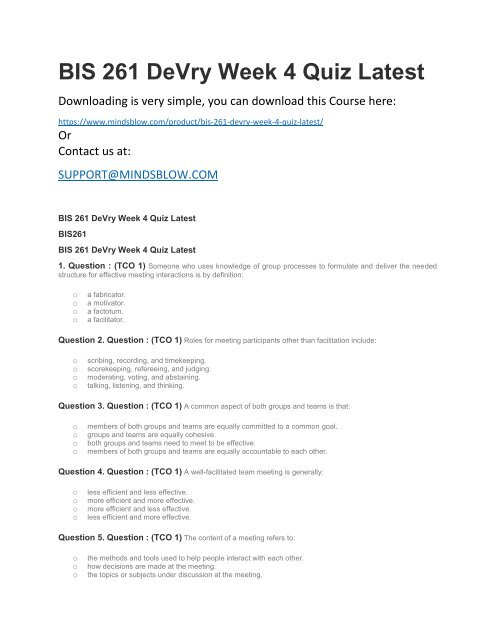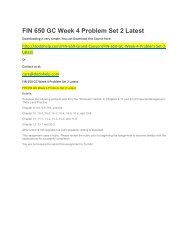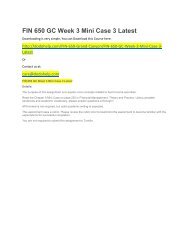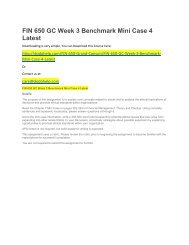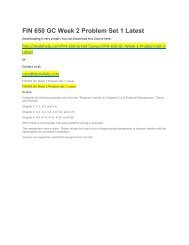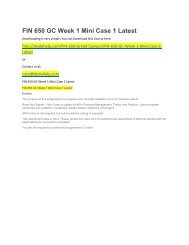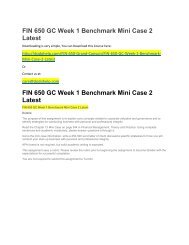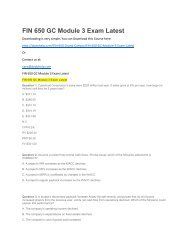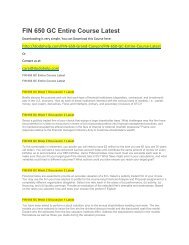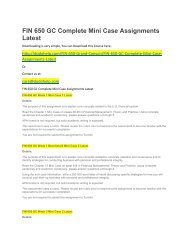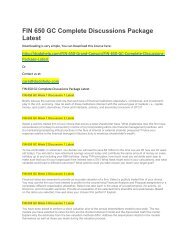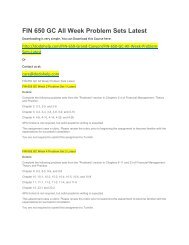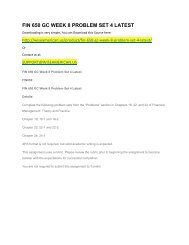BIS 261 DeVry Week 4 Quiz Latest
Create successful ePaper yourself
Turn your PDF publications into a flip-book with our unique Google optimized e-Paper software.
<strong>BIS</strong> <strong>261</strong> <strong>DeVry</strong> <strong>Week</strong> 4 <strong>Quiz</strong> <strong>Latest</strong><br />
Downloading is very simple, you can download this Course here:<br />
https://www.mindsblow.com/product/bis-<strong>261</strong>-devry-week-4-quiz-latest/<br />
Or<br />
Contact us at:<br />
SUPPORT@MINDSBLOW.COM<br />
<strong>BIS</strong> <strong>261</strong> <strong>DeVry</strong> <strong>Week</strong> 4 <strong>Quiz</strong> <strong>Latest</strong><br />
<strong>BIS</strong><strong>261</strong><br />
<strong>BIS</strong> <strong>261</strong> <strong>DeVry</strong> <strong>Week</strong> 4 <strong>Quiz</strong> <strong>Latest</strong><br />
1. Question : (TCO 1) Someone who uses knowledge of group processes to formulate and deliver the needed<br />
structure for effective meeting interactions is by definition:<br />
o<br />
o<br />
o<br />
o<br />
a fabricator.<br />
a motivator.<br />
a factotum.<br />
a facilitator.<br />
Question 2. Question : (TCO 1) Roles for meeting participants other than facilitation include:<br />
o<br />
o<br />
o<br />
o<br />
scribing, recording, and timekeeping.<br />
scorekeeping, refereeing, and judging.<br />
moderating, voting, and abstaining.<br />
talking, listening, and thinking.<br />
Question 3. Question : (TCO 1) A common aspect of both groups and teams is that:<br />
o<br />
o<br />
o<br />
o<br />
members of both groups and teams are equally committed to a common goal.<br />
groups and teams are equally cohesive.<br />
both groups and teams need to meet to be effective.<br />
members of both groups and teams are equally accountable to each other.<br />
Question 4. Question : (TCO 1) A well-facilitated team meeting is generally:<br />
o<br />
o<br />
o<br />
o<br />
less efficient and less effective.<br />
more efficient and more effective.<br />
more efficient and less effective.<br />
less efficient and more effective.<br />
Question 5. Question : (TCO 1) The content of a meeting refers to:<br />
o<br />
o<br />
o<br />
the methods and tools used to help people interact with each other.<br />
how decisions are made at the meeting.<br />
the topics or subjects under discussion at the meeting.
o<br />
methods to ensure that everyone at a meeting has an equal voice.<br />
Question 6. Question : (TCO 1) The document that defines why a team exists and what its overall goals are, is<br />
the _____.<br />
o<br />
o<br />
o<br />
o<br />
charter<br />
agenda<br />
ground rules<br />
minutes<br />
Question 7. Question : (TCO 1) The agenda defines:<br />
o<br />
o<br />
o<br />
o<br />
why the team exists and its overall goals.<br />
appropriate ways to interact with each other during a meeting.<br />
who are the group members and who is the sponsor.<br />
what will be done at a particular meeting.<br />
Question 8. Question : (TCO 1) At the beginning of a meeting, the facilitator should:<br />
o<br />
o<br />
o<br />
o<br />
immediately open the discussion on the first agenda item.<br />
ask participants to read a printed copy of the ground rules during a break.<br />
review the meeting agenda and ground rules with the participants.<br />
ask all participants to contribute suggestions for the agenda.<br />
Question 9. Question : (TCO 1) A process intervention is:<br />
o<br />
o<br />
o<br />
o<br />
an interruption by the facilitator of the meeting process and conversation.<br />
a planning session held prior to the start of a meeting.<br />
a workshop to teach team members a new interaction technique.<br />
a change to the meeting agenda to remove a controversial topic.<br />
Question 10. Question : (TCO 1) If many members of the group are having "sidebar" conversations during<br />
someone else's presentation, the recommended intervention is to:<br />
o<br />
o<br />
o<br />
o<br />
insist that all members holding sidebar conversations leave the meeting.<br />
issue a friendly reminder to the group to please hold one conversation at a time.<br />
suggest that the group consider taking a break.<br />
make a direct request to each member to hold their comments until the presenter has finished.<br />
PAGE 2<br />
1. Question : (TCO 1) A facilitator should suggest using the "parking lot" or "parking the issue" when:<br />
o<br />
o<br />
o<br />
o<br />
a group member has personally attacked another individual member.<br />
a group member has personally attacked the entire group.<br />
team members are late returning from breaks.<br />
discussions of side issues are interfering with covering the main agenda items.<br />
Question 2. Question : (TCO 1) In the rare instance that a group member cannot "let go" of a personal favorite<br />
"war story" or recurring complaint, even after repeated interventions, the facilitator should:<br />
o<br />
o<br />
o<br />
o<br />
eject the member from the meeting.<br />
notify the member's manager.<br />
accept the inevitable and allow the member to finish the story or complaint.<br />
speak to the member privately at a break, asking for his or help to keep the session moving.
Question 3. Question : (TCO 1) A facilitator should, as a last resort, invite a group member to bow out of a<br />
meeting when:<br />
o<br />
o<br />
o<br />
o<br />
the member is repeatedly late returning from breaks.<br />
the member repeatedly starts side conversations while others are presenting.<br />
the member insists on recounting a favorite "war story" that everyone has heard before.<br />
the member repeatedly launches personal attacks against others.<br />
Question 4. Question : (TCO 1) When team members are repeatedly late returning from breaks despite a light<br />
reminder, the facilitator should:<br />
o<br />
o<br />
o<br />
o<br />
stop allowing the group to take any breaks.<br />
facilitate a group discussion of why this is occurring and what to do about it.<br />
lock the door to prevent anyone who returns late from rejoining the meeting.<br />
adjust the scheduled end time of the meeting to compensate for the delays.<br />
Question 5. Question : (TCO 1) When selecting a tool for keeping a running memory, facilitators should:<br />
o<br />
o<br />
o<br />
o<br />
use computer-based tools whenever they are available.<br />
choose simple tools like flip charts instead of complex computer-based tools.<br />
choose the tool that works best for the facilitator, the group, and the environment.<br />
consistently use the same tool for every group in order to gain experience with it.<br />
Question 6. Question : (TCO 1) An advantage of appointing an individual other than the facilitator to act as a<br />
scribe or recorder is that:<br />
o<br />
o<br />
o<br />
o<br />
it gives the facilitator more control over what is recorded.<br />
it frees the facilitator to focus on group dynamics and other aspects of facilitation.<br />
no special skills are required to be a scribe or recorder.<br />
making an argumentative person the scribe can keep them from distracting others during the meeting.<br />
Question 7. Question : (TCO 1) When writing down the current issue for group discussion on a flip chart or<br />
whiteboard, the facilitator should:<br />
o<br />
o<br />
o<br />
o<br />
word the issue himself or herself.<br />
allow the person appointed as scribe to word the issue.<br />
select one person from the group at random to word the issue.<br />
let the group choose and word the issue.<br />
Question 8. Question : (TCO 1) When someone in a meeting says, "We ought to do X", the facilitator should:<br />
o<br />
o<br />
o<br />
o<br />
accept responsibility for doing X himself or herself.<br />
find out who will take responsibility for X and record it as an action item.<br />
record the idea and assign responsibility for it later.<br />
ask the person offering the suggestion to bring it up again at the end of the meeting.<br />
Question 9. Question : (TCO 1) To obtain feedback from group members, a facilitator should:<br />
o<br />
o<br />
o<br />
o<br />
invite members to e-mail the facilitator if they have any suggestions.<br />
telephone each member after the meeting and ask for personal feedback.<br />
ask participants to fill out a meeting evaluation form anonymously.<br />
ask participants to fill out a meeting evaluation form and sign their names.<br />
Question 10. Question : (TCO 1) Attributes of an effective facilitator include:
o<br />
o<br />
o<br />
o<br />
openness.<br />
inconsistency.<br />
passive listening.<br />
rigidity.


